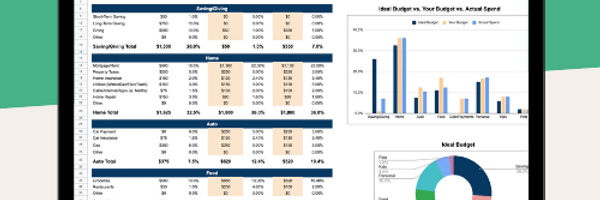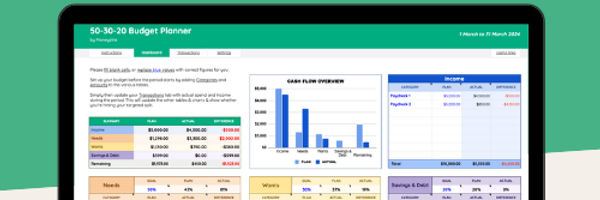In the first part of this two-part series, we explain how to find a spreadsheet application and provide a downloadable budget worksheet. We also walked through the first step in the process, which is identifying sources of household income.
In this next article, we'll talk about the second half of the balance budget equation: expenses. That discussion will include discretionary versus essential expenses, typical financial obligations of a household, as well as how to evaluate the long term sustainability of a budget.

Simple, quick, and easy monthly budget template for Google Sheets and Excel.
With this template, you will get:
Pre-set expense categories
Simplified dashboard and day-by-day monthly tracker
Automated charts for comparison
Day-by-day views for budgets and actual spend

Family Budget Basics: Expenses
Additional Resources |
Household Budget Basics Budget WorksheetFamily Budget Basics Saving Money Surviving a Recession Staying Out of Debt Financial Planning After a Death |
As we go through each section of the worksheet, it would be helpful to think about essential expenses versus discretionary ones. The harsh reality is that many individuals have limited sources of household income. If annual expenses exceed annual income, the only way to bring the budget back into balance is by lowering expenses or finding another source of income.
Essential Expenses
The last costs a family would ever think about eliminating are essential expenses. For example, if someone has a secured loan such as a mortgage or car loan, then it's important to keep making those monthly payments. Groceries are another example of essential household expenses; everyone needs to eat.
Discretionary Expenses
The costs that could be eliminated, or reduced, without too much pain are known as discretionary expenses. This can be quite subjective, so coming up with examples that won't offend someone can be difficult. The expenses that are likely to be categorized as discretionary include entertainment, recreation, luxury vacations, subscriptions, jewelry, and personal expenses.
Home Expenses
A mortgage payment is normally a consistent (predictable) cost throughout the year. The spreadsheet is set up in a way that allows the user to populate the January number and the rest of the months will populate with the same value.
Most of these remaining line items are fairly self-explanatory. Everyone should know the cost of their monthly cell phone bill. For others, such as home repairs, it might be necessary to look at records of these costs found in past credit card statements. Line 12 on the worksheet is labeled Utilities. Generally, utilities should include expenses associated with electricity, natural gas, heating oil, drinking water, and sanitary sewer.
Daily Living Expenses
This category of expenses includes items such as childcare, groceries, and dining out. This last item is something that could be considered as discretionary. Unless someone carries around a lot of cash, their credit card statement should provide enough data to get a good idea how much is spent each month on daily living expenses.
Entertainment Expenses
Many individuals have the outlook of work hard, play hard. The costs in this category are typically more discretionary than essential. This includes concerts, sporting events, musicals, plays, theater, and dining out.
Transportation Expenses
This category has more essential expenses than discretionary ones, since the majority of transportation expense should be related to commuting to work. In this category should be listed items like, mass transportation expenses, and gasoline for a car.
Health Expenses
This includes a mix of those costs that keep someone healthy, and those that are a result of illnesses. The copayment line is used to account for the expenses to see doctors that are paid for directly, not those that are reimbursed by medical insurance.
There is also a line item for life insurance that is paid for directly. This brings up a good point. If a line item does not apply, or a new one is needed, just type over a line that isn't being used. Some people pay for homeowner's insurance in their mortgage payment. If that's not the case, then overwrite another line item or put it in the category of miscellaneous payments.
Vacation, Recreational, Dues, and Personal Expenses
By now it should be clear how to go about filling in the budget worksheet, and the sources of information needed to help complete the form. Don't guess, if at all possible; especially if debt is a problem. If that's the case, there is a good chance the money spent each month is not fully understood.
Just the act of creating a budget goes a long way to enlighten people as to exactly where their money goes each month. In other words, it's an extremely valuable exercise just to go through this budget planning process.

Simple, quick, and easy monthly budget template for Google Sheets and Excel.
With this template, you will get:
Pre-set expense categories
Simplified dashboard and day-by-day monthly tracker
Automated charts for comparison
Day-by-day views for budgets and actual spend

Financial Obligations
There's an old saying that is worth sharing here: "Pay Yourself First." This means that before paying anyone else, make sure you've kept some money. This is not cash to spend on a gift; this is an investment in oneself. It's money that will be saved to pay for future expenses.
In many ways, individuals have a financial obligation to themselves. Make sure money goes into a 401(k), 403(b), or IRA account. Invest in the future because it feels good, and that's a very important component of a good budget.
Evaluating a Budget
Once the worksheet has been filled in with expenses and sources of income, take a look at the last line on the sheet labeled cash short / extra. Don't worry if some months show as cash-short. Depending on the software or spreadsheet setting, a cash-short month will be in parenthesis, in red, or with a minus sign in front of it. The most important rule for a budget is that the entire year, the annual budget, is not short of funds. This is at the far right end of the last row on the worksheet.
If the sheet shows the budget is short for the year, then double-check the spreadsheet and see if there are any glaring errors. If not, then start to think about the discretionary expenses. Start with the less painful ones, and keep working down costs until the yearend number is positive again. It's always advisable to put some cushion in the numbers too.
Unexpected expenses typically appear each year. In addition, most individuals are optimistic when establishing a budget. They think they'll spend less or have more money in a given year. A cushion removes that optimism and the risk of a shortfall if an unexpected expense arises.
Finally, creating an annual budget is not the end of the story; it is really just the beginning. Track monthly expenses and enter the actual costs into the spreadsheet throughout the year. Evaluate each month to see how the budgeted forecast compared with the actual results, and keep making adjustments. Have fun with the process; see if it's possible to beat the budget.
Other Budgeting Tools
Finally, take advantage of the other budgeting tools or calculators published on this website. If someone is having trouble making all of their debt payments, then maybe refinancing a loan or debt consolidation can help.
Anyone that would like to benchmark their household budget against some national statistics should look at our family budget calculator, which can help users to compare their household spending patterns to the national average values.

50/30/20 budget template perfect for beginners!
A few key features of this template:
Only includes the things you need – no unnecessary tabs
Included clear instructions
Pre-filled with sample data
Fully customizable to your needs

About the Author - Budget Worksheet Part II



.jpg)
.jpg)